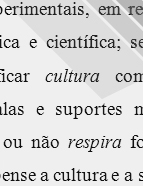

................................
It is not feasible to mention all the Histories of Literature (with the fair exception of the História da Literatura Portuguesa [History of Portuguese Literature], A.J. Saraiva / Ó. Lopes, resistant to the customary and critical versions (Reis, C., ed., 1993-2001; Alfa, ed., 2001-2003), Histories of Philosophy (with inherent risks, the overall diligence of the P. Calafate ed., 1999-2001, more than a century after Lopes Praça's meagre endeavour), Education (R. de Carvalho, 1986, A. Nóvoa, 1987), Arts, Science, intellectual and doctrinal movements, thematic dictionaries, proceedings of innumerous congresses and symposia, monographs, theses, projects that provide a qualitative account of academic and cultural life after the revolution of 25 April and which, as a whole, attest to the exploratory phase, which was credited with and correlated to the democratisation of teaching and the explosion of scientific research fostered by new post-1974 conditions and accession to the European project in 1986. However, it may be said that despite ample documental, empirical and theoretical support, there was still a lack of a systematic transdisciplinary vision of an endeavour that calls for diachronic syntheses of Portuguese culture and frees it from the small, self-absorbed circle of ‘national culture’.
6. Essayism, an original, agile hypothesis, a critical exercise cohabiting with Cartesian doubt, according to Sílvio Lima's synopsis (Ensaio sobre a essência do ensaio [Essay on the essence of the essay] 1944), provides a significant diagnosis and dialogue in the creation of inquiries into the history of culture, paving the way for new insights, some later empirically evidenced. Under the initial matrix of O. Martins and in dialogue with his theories, António Sérgio (1883-1969), a doctrinaire and paideuta, cannot be relegated in the Ensaios [Essays] to the historiographical site he did not seek, or only theoretically sought without empirical research. However, he opened up fundamental cultural clues and issues, initially in ‘Espectros’ ['Spectra'] (Ensaios [I], 1920) and ‘O Reino Cadaveroso ou o problema da cultura em Portugal’ [' The Cadaverous Kingdom or the Problem of Culture in Portugal'](1926, Ensaios, II, 1929), and in the diverse exegesis of authors, works, essential themes, from Camões to Antero (he is one of the Anterians of the first half of the century, along with J. Carvalho, Leonardo Coimbra, J. Bruno Carreiro) and from Oliveira Martins, in the ideal of democratic paideia and citizenship, to constant ‘pedagogical digressions’ on Sebastianism and the humanist ideal.
